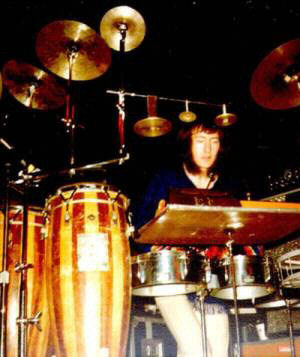 This Is Not A
BLOG!
This Is Not A
BLOG!
Date: 24/07/10
Oops!
Apologies to anyone viewing some of the Archive pages in Internet Explorer recently, who found everything shifted off to the right of the screen. This was due to a coding cock-up by Yer Judge, who now feels quite embarrassed at making such a basic mistake.
**********
The Man Who Hit The Right Notes

Morris David Brough Pert
Musician and composer
b. 9 September 1947, d. 27 April 2010
It was while I was in sixth form at the tail end of the 1970s that I first heard (and heard of) Morris Pert.
There was a rather battered old record deck in the far corner of our Common Room and while much of the stuff that was played on it was pretty standard stuff for boys in their mid/late teens who fancied themselves as the Úlite of their generation - heavy metal from Zeppelin to AC/DC, prog from Genesis to Hawkwind via Rush - there were some who were a little more subtle and adventurous in their tastes.
It was one such who one day spun us an album called Product by a band that I'd never heard of, called Brand X. There was some interest to be garnered from the fact that the drummer on most of the tracks was one Phil Collins, but I found the material itself to be intriguing.
It took me a few months (money was tight), but I managed to get hold of a copy for myself, and it immediately became one of my favourite albums. The combination of interesting musical concepts and the enthusiastic yet nuanced way in which they were played was a winning one.
In due course - a matter of years, for the same reason of financial distress - I was able to get hold of the band's other albums. Morris Pert hadn't featured on their first LP, having been drafted in for their second effort, 1977's Moroccan Roll, where he made an immediate impact on their sound. Literally, as the sleeve notes credit him as being on, "Percussion and a vast number of bits and things that he hit while the tape was running, including: the Q.E. 2, Idi Amin, and undiscovered parts of Scotland".
But Morris Pert was no stereotypical drummer of the 'bash bash thump' school. He had spent the previous years working with such luminaries as Stomu Yamashita and gaining a strong reputation as a composer. He had subtlety in his playing and his composition - reflections of his quiet, self-effacing personality - which can be heard on the one Brand X album where he was able fully to demonstrate both aspects, 1978's Masques.
He was also much in demand as a session player, too: he appeared on much of Kate Bush's seventies and eighties output, as well as working with Mike Oldfield and Peter Gabriel (check out the dense and intricate percussion part on No Self Control on Gabriel's third LP).
Latterly, he retreated to his own home and studio in the very far north-west of Scotland to continue to record and compose to critical acclaim, and it was there at Balchrick that he died, leaving behind him a body of work which - whilst only bringing him the admiration of those who look deeper than the current trend - will continue to be appreciated.
Morris Pert's MySpace page is still up so that you can hear some of his work.
**********
It may seem somewhat inappropriate to add this, but a series of thoughts came into my mind whilst researching this piece. First off, it explains why I am publishing this obit all of three months after the death of its subject.
The truth is, I didn't know. I've remarked before that there few people quite so parochial as English metropolitan critics in the fields of music and the arts in general. The same may be said for the whole of the London media, even (or, perhaps, especially) the 'serious' ones.
That it took three months for an obituary of Morris Pert to appear in any major London newspaper is indicative of those newspapers' strong tendency to look in utterly the wrong direction. It seems that if you are, say, an obscure Slovenian sociologist, a barrister with a roguish sense of propriety, or just someone who once curtseyed to the Duke of Loamshire, you have a better chance of a speedy obituary in the Guardian, the Telegraph or the Times respectively than if you were a highly-regarded performer or creator of art who happened to labour under the handicap of being born in - or of living in - Scotland, Wales or any part of rural northern England.
Not that coverage in non-metropolitan outlets is necessarily better. Pert's hometown paper, the Arbroath Herald, began its obituary with a wonderful line describing Morris Pert as, "[o]ne of the most talented musicians ever to come out of Arbroath". I chuckled at this - as I suspect its subject would have done - but at least one can say that it showed a sense of engagement. The London Meejatypes can have no such defence.

 This Is Not A
BLOG!
This Is Not A
BLOG!











